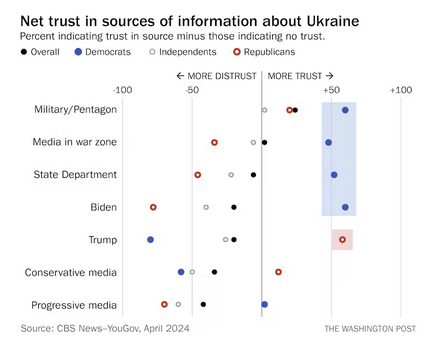One poll question summarizes eight years of Donald Trump
< < Go Back
One presentation of the rise of Donald Trump focuses on the anti-establishment backlash that the Republican Party experienced during the presidency of Barack Obama. The tea party was one manifestation, and Trump’s appearance as a presidential candidate in 2015 did attempt to leverage that frustration with establishment Washington.
More important, though, was the overlap between that anti-establishment sentiment and the embrace of outright false claims about political subjects. Part of the frustration with Republican leaders was that their actions and rhetoric were increasingly divergent from the rhetoric on Fox News and on fringier upstarts like Breitbart. Trump was both unattached to D.C. respectability and immersed in the fringe-right vernacular, and that’s what he presented to Republican primary voters.
This was the origin of the idea that Trump speaks frankly while others don’t. It wasn’t that he was honest; far from it. It was that he said the things that his supporters were hearing from (dishonest) actors elsewhere because he didn’t care about being seen as dishonest. His supporters saw this as unusual honesty, when it was in fact the opposite.
Trump’s dishonesty has been relentless ever since, often infecting his allies and his party. But he retains a perception of honesty and frankness among his supporters because they dislike and distrust those pointing out his dishonesty — his opponents, the media, etc. Trump is granted the benefit of the doubt, despite being perhaps uniquely undeserving of it.
Over the weekend, CBS News published the results of a poll conducted this month by YouGov. It focused on views of the wars in Ukraine and Gaza, but included a telling question related to the point above.
Respondents were asked to evaluate whether they viewed different sources of information about the war in Ukraine as trustworthy. Overall, only two sources were viewed as more trustworthy than not: the military/Pentagon and journalists and media operating in the war zone. Every other presented option was underwater, with more people saying they viewed them as untrustworthy than as trustworthy.
In part, that was because of broad skepticism from independents, who are generally more likely to indicate distrust when asked such questions. Only the military was viewed as more trustworthy than not on net among independents.
But it was also because, among Republicans, the only broadly trusted source of information about the war was … Donald Trump.
President Biden was viewed as trustworthy by four times as many Democrats as deemed him not trustworthy. That was a similar ratio to other sources of information: the military, the State Department, the media. Among Republicans, though, only Trump earned that level of confidence.
More From The Washington Post (subscription required):




